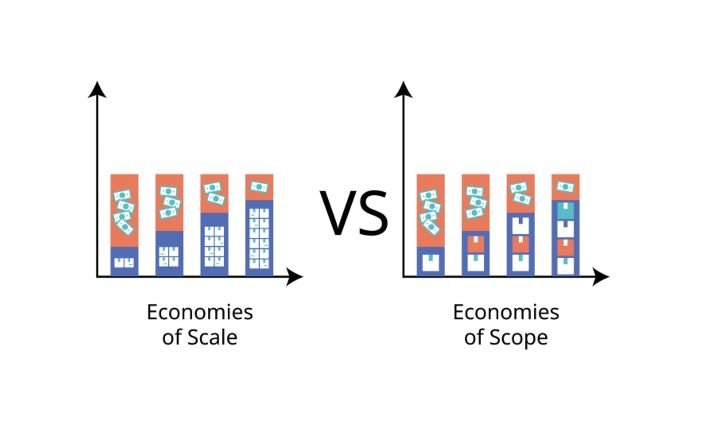
By Dr. Maxwell Ampong
In today’s highly competitive global market, the pressure on businesses to minimise costs and enhance efficiency is greater than ever. This is particularly true for Ghana, where both large corporations and small-to-medium enterprises (SMEs) are navigating the same dynamic economic landscape. Amid the challenges of rising operational costs, fluctuating demand, and increasing competition, achieving cost leadership, which is the ability to offer goods or services at a lower price than competitors, has become essential for long-term success.
Historically, economies of scale have been the go-to strategy for achieving cost leadership. By producing large quantities, businesses benefit from reduced costs per unit, making it easier to maintain competitive pricing. However, while this approach remains valuable, there are other pathways to cost efficiency. In fact, economies of scope offer an equally powerful and often more flexible solution for many businesses, particularly those with diverse product lines or operating in fluctuating markets like Ghana’s.
Economies of scope, which involve cost savings through diversification rather than volume, provide businesses with a complementary and sometimes more effective way to achieve sustainable cost leadership. This concept holds significant potential for businesses in Ghana, where diversification is becoming a strategic necessity in response to shifting market conditions and evolving consumer demands.
Ghana’s economy and her diverse sectors, from agriculture to technology, present an ideal context for economies of scope to thrive. Local businesses, especially SMEs, are increasingly recognising the need to diversify their offerings to remain competitive. As globalisation continues to influence local markets and consumers demand more variety, economies of scope provide a strategic advantage.
UNDERSTANDING ECONOMIES OF SCALE VS ECONOMIES OF SCOPE
In business, two powerful concepts often arise in conversations about cost efficiency and growth strategies: economies of scale and economies of scope. While both offer pathways to cost reduction, they differ in their approach and impact, especially in the context of Ghana’s emerging industries.
Economies of Scale
Economies of scale have long been the cornerstone of cost leadership strategies. The principle is simple: the more of a product a company produces, the lower the cost per unit. This reduction in unit cost occurs because fixed costs such as machinery, factory space, and administrative overheads are spread over a larger number of goods, driving down the average cost.
For instance, if a Ghanaian textile manufacturer focuses on producing one type of fabric at high volumes, it can lower its cost per yard by purchasing raw materials in bulk, streamlining its production processes, and maximising the use of its equipment. The result is a lower price per unit, which allows the company to compete on price and potentially dominate the market.
However, economies of scale often come with limitations. Businesses reliant solely on this strategy may struggle to adapt to changing market demands, or they might find themselves vulnerable during downturns when consumer demand for a single product declines. In Ghana, where economic conditions can fluctuate and consumer preferences evolve rapidly, companies that focus only on scaling up the production of a single item may miss opportunities for diversification, flexibility, and resilience.
Economies of Scope
Economies of scope offer a different, and often more versatile, approach to achieving cost leadership. Rather than focusing on producing a large quantity of a single product, businesses can reduce costs by diversifying their product offerings. This strategy allows companies to leverage shared resources such as machinery, labour, marketing channels, or distribution networks across multiple product lines.
For example, a Ghanaian agro-processing company might expand its operations beyond producing just shea butter to also offer related products like soaps, lotions, or even shea-based food products. By doing so, the company can use the same equipment, staff, and marketing efforts for all these products, effectively spreading its fixed costs across a broader range of offerings. This leads to lower average costs while simultaneously opening up new revenue streams.
Unlike economies of scale, which focus on increasing volume, economies of scope focus on increasing variety. This allows businesses to be more adaptable to market changes and customer preferences. For Ghanaian companies, especially SMEs, economies of scope present an opportunity to not only reduce costs but also hedge against risks associated with relying on a single product line.
Core Differences
The key distinction between these two strategies lies in their approach to cost efficiency. While economies of scale concentrate on achieving lower costs through higher volumes, economies of scope achieve cost savings through diversification and shared resources. Economies of scale are about doing more of the same thing, whereas economies of scope are about doing different things more efficiently together.
In Ghana’s business landscape, where industries such as agriculture, technology, and manufacturing are growing, businesses are increasingly recognising the value of economies of scope. By diversifying product lines and spreading resources efficiently, companies can achieve sustainable growth and reduce the risks associated with market fluctuations. In contrast, while still relevant, economies of scale may limit flexibility and innovation.
HOW ECONOMIES OF SCOPE PROVIDE A COST LEADERSHIP ADVANTAGE
In a competitive market, businesses are constantly seeking ways to lower costs and gain a strategic edge. Economies of scope offer an alternative pathway to cost leadership. Instead of relying solely on increasing production volume, economies of scope focus on producing a diverse range of products using shared resources, which can dramatically reduce overall costs. In Ghana, where market fluctuations and consumer preferences continuously evolve, this approach is particularly valuable for businesses looking to maintain flexibility and profitability.
Shared Resources
One key benefit of economies of scope is the ability to share resources across multiple product lines. This includes sharing machinery, labour, and even distribution networks. By doing this, businesses can avoid duplicating expenses for each product they produce, thereby significantly lowering their operational costs.
Take, for instance, a Ghanaian company involved in agro-processing. If this company initially produces only palm oil, it may face certain fixed costs, such as purchasing and maintaining processing equipment, paying labour, and covering facility expenses. However, by diversifying into producing additional related products, like palm kernel oil or soap, the same machinery and labour force can be used for multiple production processes.
This maximisation of existing resources leads to cost reductions across all product lines, thereby allowing the company to offer competitive pricing without sacrificing profitability. This also eliminates the need for separate teams and helps businesses in Ghana optimise their labour force without adding significant overhead costs.
Maximising Capacity
Economies of scope also allow businesses to make more efficient use of their capacity. When a company produces a single product, there may be periods of downtime or underutilisation of their facilities. However, by introducing multiple related products, businesses can ensure that their production facilities are used more consistently and efficiently.
For example, a Ghanaian furniture manufacturer that initially produced only chairs could expand to produce tables, benches, and other wooden furniture. By doing so, the company ensures that its machinery, materials, and workforce are used throughout the year rather than experiencing seasonal or product-specific downtimes. This maximised utilisation of capacity results in the business spreading its fixed costs, such as rent, salaries, and utilities, across a broader product range, ultimately lowering the per-unit cost of each product.
This flexibility is particularly important in Ghana’s diverse economy, where sectors like agriculture or construction may face seasonal demand variations. By diversifying their product lines, companies can adapt more quickly to these fluctuations, maintaining steady production levels and reducing the impact of off-peak periods.
Marketing and Brand Synergy
Economies of scope can also lead to significant cost savings in marketing and branding. Companies that already have an established brand in one product category can leverage this recognition to introduce new products, reducing the need for costly and time-consuming brand-building campaigns.
Consider a well-known local skincare brand in Ghana. Suppose this brand is trusted for producing high-quality body lotions. In that case, it can easily expand into related products, such as facial creams or soaps, without having to invest heavily in introducing a new brand to the market. Consumers are more likely to purchase additional products from a brand they already trust, allowing businesses to capitalise on their existing reputation.
This marketing synergy reduces the overall costs associated with promoting each new product, as advertising efforts for one product can simultaneously boost visibility and sales for others.
Additionally, businesses can often use the same distribution channels and sales teams, further lowering costs while expanding their reach in the market.
In Ghana, where businesses often have limited marketing budgets, economies of scope offer a powerful way to extend brand influence across multiple product lines without significantly increasing promotional expenses.
ECONOMIES OF SCOPE IN ACTION: PRACTICAL EXAMPLES
To truly understand how economies of scope can offer a competitive advantage, we need to look at both global giants and local businesses that have successfully leveraged this strategy. The ability to reduce costs by diversifying production while using shared resources is not only a theory but a practical tool that has transformed companies across industries. This section will explore how businesses around the world, including Ghanaian enterprises, can and have capitalised on economies of scope to enhance their cost leadership strategy.
Global Examples
Globally, some of the most successful companies have built their empires by mastering economies of scope. These businesses have strategically expanded their product lines, using shared resources such as manufacturing facilities, supply chains, and marketing channels to reduce costs and increase efficiency. Here are a few noteworthy examples:
• Procter & Gamble (P&G): As one of the largest consumer goods companies in the world, P&G is a master of economies of scope. The company produces a wide range of products, from personal care items like shampoos to household cleaning products. Instead of maintaining separate production lines for each product, P&G uses common marketing strategies, distribution networks, and even research and development resources across their product portfolio. This approach allows them to reduce costs and maintain profitability across a diverse range of offerings, giving them a competitive advantage in the global market.
• Apple Inc.: Apple’s product ecosystem is another example of economies of scope at work. By producing hardware (iPhones, iPads, MacBooks) and complementary software (iOS, macOS), the company shares design teams, marketing channels, and even retail spaces across multiple product lines. This seamless integration between products reduces costs and enhances customer loyalty. Each product complements the other, creating a cohesive ecosystem where the success of one product line boosts the entire range.
Local Relevance: Ghana’s Potential for Economies of Scope
While global examples provide valuable insights, the true power of economies of scope lies in its adaptability to local contexts. Ghanaian businesses, especially those in rapidly growing sectors like agriculture, technology, and manufacturing, are well-positioned to benefit from this strategy.
• Agro-processing Industry: Ghana’s agro-processing sector offers significant opportunities for economies of scope. For example, a business processing cocoa could expand its operations to produce related products, such as cocoa butter, cocoa powder, and even chocolate. By using the same equipment, packaging facilities, and distribution networks, the company can significantly reduce the cost of entering new product categories. This not only diversifies its revenue streams but also ensures more efficient use of resources, which is crucial for maintaining competitiveness in local and international markets.
• Ghanaian Tech Startups: Ghana’s growing technology sector also stands to benefit from economies of scope. A tech company that starts by developing mobile apps can expand into web development, software solutions for businesses, or even digital marketing services. By diversifying into complementary services, the company can use the same technical team and infrastructure, reducing the costs of hiring separate teams or investing in new tools for each service. This allows the business to offer a broader range of services at a competitive price while improving customer retention by being a one-stop shop for digital solutions.
Maximising Economies of Scope for Ghanaian Businesses
For Ghanaian businesses, especially SMEs, economies of scope offer a practical way to grow without taking on the financial burden of large-scale investments in new resources. By diversifying strategically, businesses can reduce risks, increase operational efficiency, and position themselves for sustainable growth.
This is particularly important in sectors where Ghana holds a natural competitive advantage. By using shared resources, whether it’s machinery, labour, or marketing channels, businesses can achieve greater economies of scope, strengthening their foothold in local and global markets. With rising competition and market shifts both locally and globally, economies of scope provide a vital strategy for Ghanaian enterprises looking to remain competitive and thrive in an ever-changing business landscape.
CHALLENGES IN IMPLEMENTING ECONOMIES OF SCOPE
While the benefits of economies of scope can significantly enhance cost leadership, the journey toward realising these advantages is not without its challenges. For Ghanaian businesses, particularly SMEs, successfully implementing economies of scope requires overcoming a variety of operational and strategic hurdles.
Operational Complexity
One of the most significant challenges businesses encounter when adopting economies of scope is the increased complexity of managing multiple product lines. While producing a variety of goods may reduce overall costs, it also requires more sophisticated coordination across various functions such as supply chains, production schedules, and marketing strategies.
For example, a textile company in Accra that produces both traditional fabrics and ready-made garments must coordinate raw material procurement, production timelines, and distribution for each product line. The risk of bottlenecks increases when managing diverse operations, and failure to streamline these processes can lead to inefficiencies that undermine the cost benefits of economies of scope.
In the Ghanaian context, where SMEs may need more access to advanced management systems or face constraints in skilled labour, this operational complexity can be daunting. Many businesses may find it challenging to scale up their operations while maintaining the organisational coherence required to succeed.
Resource Dilution
Another critical challenge is the risk of resource dilution. When companies diversify their products, there is a temptation to spread resources too thin, such as capital, labour, and management. If resources are not managed carefully, this can lead to underperformance in all areas.
For instance, a small manufacturing business in Ghana that shifts from producing agricultural tools to adding a line of home appliances may find itself lacking the necessary expertise, equipment, or managerial focus to excel in both areas. If too many resources are directed toward the new product line, the original business may suffer, leading to an overall decline in quality and profitability.
For businesses in developing economies like Ghana, where access to capital and skilled labour can be limited, it is crucial to balance resource allocation carefully. Expanding into new product lines should be a calculated move, backed by solid market research and a clear understanding of the company’s capacity to maintain quality across all areas.
Strategic Misalignment
Diversification for the sake of diversification can be a pitfall for businesses attempting to capitalise on economies of scope. When companies expand into unrelated product lines or fail to align their new ventures with their core competencies, they risk strategic misalignment. This misstep can dilute the brand’s value and confuse customers, which ultimately erodes market positioning.
In Ghana, this is a common risk for businesses eager to tap into new markets without sufficient analysis of how these ventures fit within their overall strategic goals. For example, a well-established food processing company might be tempted to diversify into unrelated ventures like real estate development. While this may seem lucrative, it could divert focus from its core competencies, leading to a loss of market share in its primary industry. Such strategic misalignment often results in reduced profitability and an inability to sustain the economies of scope that initially motivated the diversification.
Examples of Over-Diversification and Failures
Numerous examples, both locally and globally, exist of businesses that have faltered due to over-diversification or poor execution of economies of scope.
One well-documented example of over-diversification is General Electric’s (GE) case, particularly in the 2000s. GE, once one of the most valuable companies in the world, suffered from a strategy of aggressive diversification into too many unrelated sectors.
Historically, GE has operated successfully in various industries, from manufacturing and aviation to financial services and healthcare. However, during the late 1990s and early 2000s, under the leadership of CEO Jack Welch and later Jeffrey Immelt, GE expanded even further, particularly into financial services through GE Capital.
The decision to diversify heavily into finance proved to be problematic. GE Capital accounted for nearly half of the company’s profits, but the 2008 financial crisis exposed the fragility of this over-diversification. GE’s reliance on financial services, an industry outside its core competencies, led to significant operational inefficiencies and massive financial losses as the global economy faltered. The company struggled with its sprawling operations and failed to maintain consistent profitability across its diverse portfolio.
Over time, GE was forced to sell off several of its divisions, including its once-thriving financial services arm, GE Capital, and even parts of its healthcare and energy businesses. This lengthy process of divestiture was necessary to bring the company back to its core strengths. Still, GE’s missteps in over-diversification remain a cautionary tale of how economies of scope, if poorly executed, can lead to strategic misalignment and financial instability.
This example shows how businesses can falter when they diversify into unrelated sectors, stretching their resources too thin and losing focus on their core competencies.
Local examples include small family-owned businesses in Ghana, where owners expand into industries outside their expertise. Many suddenly do real estate without fully understanding the complexities of the new industry. These ventures often fail due to a lack of synergies between the old and new operations, highlighting the risks of over-diversification and poor strategic planning.
THE ROLE OF ECONOMIES OF SCOPE IN GHANA’S ECONOMIC DEVELOPMENT
Ghana’s economy is at a pivotal point, with industries rapidly expanding and businesses striving to remain competitive on both local and international stages. As companies navigate rising costs, technological advancements, and evolving consumer demands, economies of scope have the potential to play a critical role in driving economic development.
Ghana’s Economic Environment
Ghana’s economy is built on diverse industries, from agriculture to manufacturing and services. While agriculture remains a cornerstone, with cocoa, timber, and gold among the key exports, the service and technology sectors are gaining prominence. In such a multifaceted economy, businesses are increasingly recognising the need to diversify their offerings and reduce their reliance on a single product or market.
Economies of scope can be instrumental in addressing some of the challenges that Ghanaian businesses face. By expanding their product lines, businesses can spread their costs over a broader range of goods and services, making more efficient use of their resources. This diversification strategy allows companies to tap into new markets, mitigate risks, and remain competitive during economic fluctuations.
Sectoral Opportunities
1. Agriculture: Ghana’s agricultural sector is particularly well-positioned to benefit from economies of scope. Agricultural enterprises, particularly those in agro-processing, can diversify into related products with relatively minimal additional investment. For example, a company that processes cassava can also produce gari, cassava flour, and ethanol, using much of the same equipment and expertise. This diversification reduces operational costs and helps cushion the business against price fluctuations in any single product.
2. Technology: The tech sector in Ghana, which has seen a surge in start-ups and innovation hubs, can also harness economies of scope by branching out into complementary services. A company specialising in software development might diversify into hardware solutions, such as mobile devices or smart home technologies, thereby offering a full suite of digital solutions. Using the same development teams and marketing resources across multiple product categories, these businesses can reduce costs and increase market reach, driving growth in the local digital economy.
3. Manufacturing: For Ghana’s manufacturing sector, economies of scope offer a pathway to increased efficiency and reduced costs. Manufacturers producing one type of product can expand into related goods, sharing production lines and infrastructure. For instance, a company that makes construction materials might diversify into different kinds of building supplies or even home improvement tools, using the same supply chains and labour force. This not only spreads fixed costs but also creates synergies that can enhance innovation and responsiveness to market demands.
Government and Policy Support
To fully realise the potential of economies of scope in Ghana’s economic development, the government must provide an enabling environment through policy support. The government’s role in fostering diversification can be pivotal in several ways:
1. Tax Incentives: I know, I know. This is a stretch. However, with rising taxes in Ghana, tax breaks could be deployed as a tool to promote and encourage good practices that add to the health of our national economy. Tax breaks or incentives for businesses that diversify their offerings could encourage companies to explore new products or services. This policy could reduce the financial risk of diversification, allowing businesses to experiment with new product lines without the burden of excessive taxes on initial investments.
2. Infrastructure Development: Developing the necessary infrastructure, such as roads, power supply, and logistics networks, will ensure that businesses can efficiently distribute their diversified products. Improved infrastructure will also reduce transportation and operational costs, which is essential for businesses looking to implement economies of scope.
3. Partnerships and Trade Agreements: The government can also establish international trade agreements that open up markets for Ghanaian products, particularly those created through diversified production processes. By partnering with international bodies and regional trade associations, Ghanaian businesses can gain access to larger markets and achieve the scale necessary to fully benefit from economies of scope.
4. Support for SMEs: Small and medium-sized enterprises (SMEs), the backbone of Ghana’s economy, require targeted support to implement economies of scope successfully. The government can offer grants, training programs, and technological support to help SMEs diversify their product lines and make better use of shared resources. This will not only promote innovation but also boost their competitiveness in both domestic and international markets.
NEXT STEPS: LEVERAGING ECONOMIES OF SCOPE FOR FUTURE GROWTH
As businesses in Ghana navigate the ever-changing landscape of both local and global markets, economies of scope offer a vital strategy for ensuring sustainable growth. While economies of scale have long dominated cost-reduction efforts, economies of scope provide businesses with the flexibility to diversify, share resources, and reduce costs across multiple product lines, making them well-suited for the dynamic environment in which Ghanaian businesses operate.
Call to Action for Ghanaian Businesses
To remain competitive in today’s changing economic environment, Ghanaian businesses, particularly SMEs, should seriously consider integrating economies of scope into their growth strategies. Here are some actionable steps to take:
1. Assess Diversification Opportunities: Begin by analysing your current operations and identifying complementary products or services that can be produced or offered using existing resources. For instance, a small manufacturer producing building materials might explore opportunities to add furniture or home improvement products to its offerings, thereby maximising its production capacity.
2. Invest in Technology and Training: Ensure your workforce is well-trained to handle the complexities of managing multiple product lines. Additionally, invest in technology that allows you to streamline operations across different business segments. For example, integrated inventory management systems or digital platforms that manage both product lines and customer data can reduce operational friction and enhance productivity.
3. Leverage Marketing Synergies: Build upon your brand’s existing recognition by using economies of scope to enter new markets or launch related products. If your business is already trusted for one product, explore ways to introduce complementary goods that benefit from the same marketing campaigns, sales channels, or customer trust.
4. Mitigate Risks: As you expand your product lines, focus on the core competencies that define your business’s strength. Avoid over-diversification by ensuring that new products align with your business’s capabilities and long-term goals. Regularly review performance metrics to ensure that resource allocation remains balanced and effective.
5. Engage with Policy Support: Take advantage of any government programs, incentives, or infrastructure developments that encourage diversification. Whether through tax relief for new ventures or trade agreements that open international markets, the right policy support can enhance your ability to succeed in multiple product categories.
By embracing economies of scope, Ghanaian businesses can achieve cost leadership and long-term resilience and flexibility in an unpredictable economic landscape. As competition increases and markets evolve, the ability to diversify and share resources will be critical for businesses that want to stay ahead.
Economies of scope provide a pathway to future growth, ensuring that businesses are not limited by their existing products but are empowered to explore new opportunities and expand their impact.







